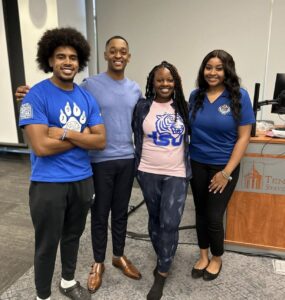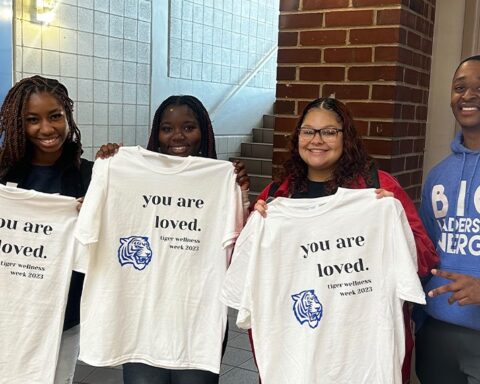By Alexis Clark
In the midst of finals, winter blues, and the holiday season, Tennessee State University students are prioritizing their mental health.
SGA student leaders partnered with the University Counseling Center for “Tiger Wellness Week.” The goal was to address the emotional well-being of students during this time of the year.
SGA president Derrell Taylor said the activities were designed to help students recognize the value of their mental health.
“From distributing “You Are Loved” t-shirts to passing out affirmations and creating stress balls, our focus was internal, mental, and physical well-being,” said Taylor, a senior who is a business major.
Taylor added students even did yoga as a preventative measure to ward off the “holiday blues” during what’s considered the happiest time of the year.
“Towards the end of the semester, we deal with finals and it’s a lot of anxiety for most students. It’s a draining time of the year. The goal was to wrap up the semester on a positive note and remind students that, despite the emotional challenges of the holiday season, they are supported.”
Travis Ducksworth, the first mental health ambassador of TSU’s counseling center,” shared insights into the impact of Tiger Wellness Week. “We were able to give people a reason to reflect and appreciate themselves even more,” Ducksworth said. “Especially during the winter months, once that sun goes down sooner, sometimes your emotions do too.”
The emphasis is on finding creative ways to help students balance their collegiate life while prioritizing mental health.
“Regardless of what your situation is, stay present,” Ducksworth advised.
Elizabeth Armstrong, a therapist at TSU’s counseling center, highlighted the importance of treating mental health as an aspect of overall health. She addressed the cultural stigmas surrounding African American mental health, urging students not to wait until they’re in crisis to seek counseling.
“Mental health is still health,” Armstrong said. “It’s important because the majority of our population, culturally, have dealt with a lot of trauma.”
63% of Black adults believe that a mental health condition is a sign of ‘personal weakness,’ according to the National Alliance of Mental Illness.
“People seem to think something must be extremely wrong to come to counseling, part of even normalizing that is making people aware that you don’t have to be in crisis to come to counseling. But if you’re struggling with your mental health in general, don’t suffer in silence,” stressed Armstrong.
As the semester comes to an end, Amore’ Dixie, Representative at Large for the Counseling Center, offered encouragement for students to finish strong mentally first to finish academically.
“I highly encourage everyone to stay focused, stay positive, and make sure to turn in all of their work on time,” Dixie said.
“Don’t give up now, we’re almost at the home stretch. If you are feeling overwhelmed or just want to talk to someone, be sure to stop by the Counseling Center where one of the therapists can better assist you.”
Regarding the prevalence of mental health challenges among college students, data from the American Psychological Association shows that over 60% of college students experienced at least one mental health problem during the 2020–2021 school year.
According to the American Journal of Epidemiology there has been little research on the association between HBCU attendance and mental health compared to PWI attendance. Despite this gap in research, the American Journal of Epidemiology reports that cross-sectional surveys found better health outcomes for Black students enrolled at HBCUs, including less drinking, fewer mental health conditions, better body image, and more social support.
The week-long event helped students understand and communicate their emotions. It culminated with a balloon release with messages inside, symbolizing letting go of anything holding students back.
“Moving forward, we plan to collaborate with the University counseling center to implement more consistent check-ins, mental health events, and comfortable, open spaces on campus,” Taylor said, noting that hosting events in the spring will be beneficial as well.


